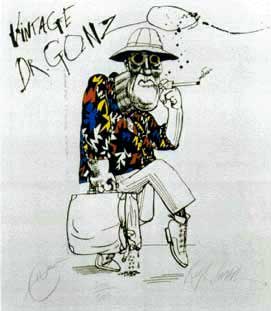In the lead
 Journalism gurus often tell cub reporters to keep their articles succinct up top. Get as much news in the first sentence as grammatically possible, qualify this statement with a rapid-fire flurry of facts and then save the rest of the banter for the jump page.
Journalism gurus often tell cub reporters to keep their articles succinct up top. Get as much news in the first sentence as grammatically possible, qualify this statement with a rapid-fire flurry of facts and then save the rest of the banter for the jump page.The notion is that a good percentage of the news consuming public never makes it past the lead, much less onto another page; they read the headlines and maybe one or two sentences at the top before leaving the coffee shop or finishing their bowel movement.
Grizzled veterans of the news business will also slap a regulator on leads, limiting writers to about 30 words to get their point across. In some more complicated situations, this allotment can burgeon up to 45 and sometimes 50 words without drawing editorial ire. However, much over this amount can be cumbersome to digest for even readers more accustomed to stream of consciousness babble.
 The editors over at the Glens Falls Post Star clearly decided to push this envelope. The paper may very well have earned a spot in the state record books with for the longest lead ever written in a New York daily. In an article appearing Friday, the reporter secured a solid 67-word introductory sentence to an article about Rudy Giuliani’s visit to the track.
The editors over at the Glens Falls Post Star clearly decided to push this envelope. The paper may very well have earned a spot in the state record books with for the longest lead ever written in a New York daily. In an article appearing Friday, the reporter secured a solid 67-word introductory sentence to an article about Rudy Giuliani’s visit to the track.“Rudolph Giuliani strolled through the historic grounds of the Saratoga Race Course on a sunny, Thursday afternoon with the confidence of a man who could be president –even as the memories provoked by the approaching sixth anniversary of 9-11 are filled with the indelible stains of Giuliani's walk through the ravaged city streets, wearing the ash and the rubble of the old world across his face,” the reporter wrote.
True, it’s difficult not to conjure images of 9-11 when Rudy’s walking by. But tacking on more than five dozen words of pomp and brazen bravado is a bit much, even when introducing a guy that quite candidly falls back on his legacy during that fateful day. In other words, why fan this guy’s flames? He does a good enough job doing this on his own.
 To the reporter’s credit, he did manage to write a mighty long sentence that appears grammatically sound. And he’s in good company if writing verbose sentences is his game. William Faulkner extended one sentence in Absalom, Abaslom! for more than 1,200 words. But he couldn’t hold a candle to his contemporary, renowned Irish writer James Joyce, who managed a sentence spanning 4,391 words in his novel, Ulysses. In the news business, however, it’s best to keep things short, even when writing about a guy who is doing his best to live large.
To the reporter’s credit, he did manage to write a mighty long sentence that appears grammatically sound. And he’s in good company if writing verbose sentences is his game. William Faulkner extended one sentence in Absalom, Abaslom! for more than 1,200 words. But he couldn’t hold a candle to his contemporary, renowned Irish writer James Joyce, who managed a sentence spanning 4,391 words in his novel, Ulysses. In the news business, however, it’s best to keep things short, even when writing about a guy who is doing his best to live large.


5 Comments:
speaking of length ...
whats up with these 100-inch NO-SOURCE (!) stories that keep appearing in the saratogian's sports section?
are you going to weigh in on that soon?
Rudy Giuliani, running on the fascist fear ticket. He is a filthy profiteer of tragedy with those speaking fees and books ($11 million), and now he is milking it to try and get into the White House. Don't give this psycho the keys to our country! Why couldn't he have been trampled on Friday by a wayward horse?
Alger, you bumbler, why has this blog not acknowledged the exceedingly gracious (and deserved) plug it got over at Kunstler.com's local Civitas newsletter, which is also full of other good stuff? Have you not read his books "The Geography of Nowhere" and "Home from Nowhere," which, apart from being brilliantly readable and full of local nuggets, tell you everything you need to know about land use in the good ol' USA? Just because Jim K has gone a bit off the deep end with all this running-out-of-oil hence sky-is-falling routine, doesn't mean he isn't right about architecture, zoning and like matters, and a peerless guide to local life. For shame, Alger, pay tribute, dammit, and read those two books at least, willya?
You failed to point out that journalists are also trained to call the first graf the "lede," not the lead.
The term 'lede' is jargon, much like the term 'graph' and assorted other banter journalists like to use. And as we all know, editors aren't too keen on the use of jargon.
Find me a printed dictionary that foists this as a real word and I'll gladly change my usage of the word "lead," which is also perfectly acceptable in this case.
Post a Comment
<< Home